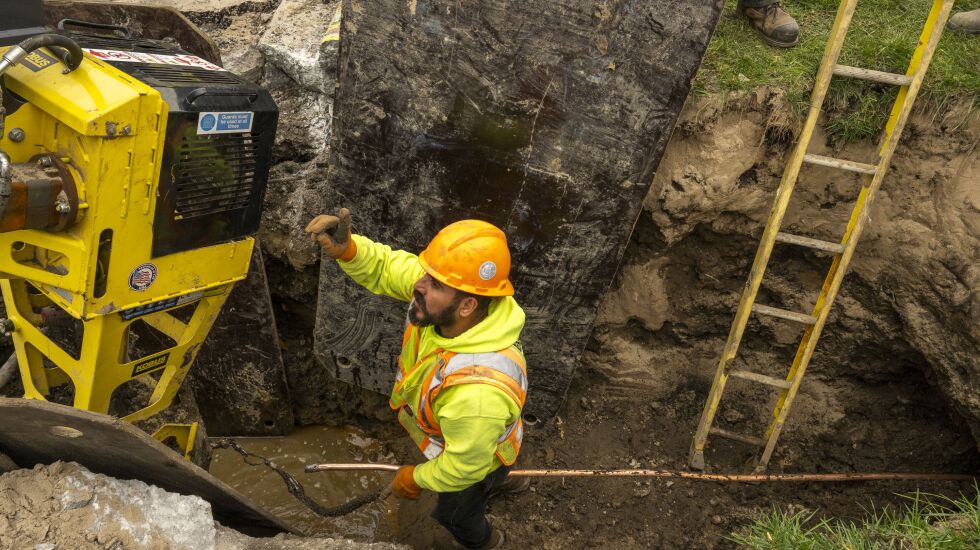
President Joe Biden’s administration is loaning Chicago $336 million to help the city pay for the replacement of tens of thousands of lead water pipes.
Unfortunately, it’s not even close to being enough money to fix the problem of stopping brain-damaging lead from flowing through Chicagoans’ primary source of water.
With the loan finalized and announced Friday, the money is expected to help the city replace 30,000 lead service lines — out of more than 400,000 — the largest number in the country.
The loan from the U.S. Environmental Protection Agency will help the city pay for lead line replacements when there is a leak or break or other maintenance required by the city.
“This is something that we can do. It is long past time that we do it,” Sen. Tammy Duckworth said at a news conference in Calumet Heights announcing the loan.
Duckworth made her comments in front of the home of Tourance Smith, who watched as a city crew fixed a pipe near his front yard and replaced the lead line connecting his plumbing to the city’s water supply.
Smith said he’s been drinking filtered water since he moved into his house about a year ago. He said he was told it would cost him $30,000 to replace the line if he paid for it himself.
“When they said it would be free, I said ‘sure,’” Smith said.
Other cities have tackled the lead pipe issue, some even declaring the problem a public health crisis. Chicago has by far the largest number of lead lines.
“Why is it important? Because there is no acceptable exposure to lead. Period,” said Sen. Dick Durbin.
To date, Chicago has replaced almost 3,800 lines from a total of about 409,000 — an updated figure that is larger than past estimates, Department of Water Management officials said Friday.
The city has a goal of replacing 8,000 lines next year, the department said.
The city has been criticized for years as being too slow to address the problem, and even modest targets for replacing lead service lines in low-income neighborhoods fell short under former Mayor Lori Lightfoot’s administration.
The city’s water department was anticipating closing on the loan early this year, and the dollars were already penciled in to fund part of the pipe replacement program this year and beyond.
The money will be used to reimburse the city for part of the work done in 2023 and over the next several years.
Gov. J.B. Pritzker and state lawmakers allowed Chicago to take more than 50 years to replace all the lead lines in the city, a much longer time frame than the Biden administration has suggested.
EPA officials acknowledge that Chicago is going to have to figure out how to ramp up its program beyond the just-announced loan.
“Chicago has a very big task before it,” the EPA’s Radhika Fox said in an interview. “More resources are going to be needed.”
Fox, an assistant administrator for water at EPA, added that Chicago and other cities will need to step up and try to tap all federal money sources.
“It’s time to get the lead out of communities across the country because there is no safe level of lead,” Fox said.
Mayor Brandon Johnson said that the city will prioritize pipe replacements in low-income communities of color that have high numbers of lead pipes.
“Black and Brown communities are already grappling with the disparate environmental and health impacts,” Johnson said. “We recognize that lead exposure is a compounding factor that must be addressed.”
Johnson said child day care centers are being prioritized through a program started under Lightfoot.








